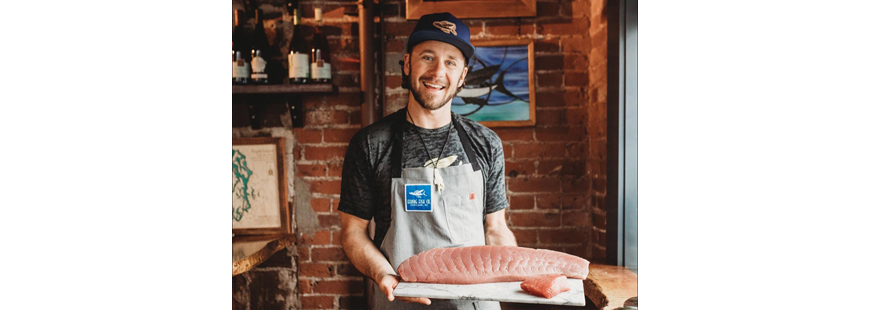Photo by Natalie Gildersleeve
There’s lots to be thankful for, lots to honor and cherish, in this industry. For National Seafood Month, I wrote about the people who provide nutritious, sustainable seafood for my business. In the second half of this two-part retrospective, I’m highlighting the ways in which the people who I sell seafood to, members of my own community, stayed strong during the pandemic and even used sustainability and a newfound connection to their food to grow a little bit themselves.
The pandemic affected every single human on planet earth. For nearly all of us, its seismic cultural shifts instigated change in nearly every aspect of our lives. For seafood consumers, this meant cooking at home, some even for the very first time. For businesses, it meant adjusting to provide new opportunities for customers, provide interesting recipes for both seasoned and first-time home chefs, and generate and share expertise on the narrative of the fish itself.
Some businesses fared well, while others suffered tremendously or sank. It’s been a year and a half of varying mandates, recommendations, and requirements. Each state has a different strategy, which has either positively affected business or negatively affected business. For many, it meant the end of the line.
In Portland, Oregon, 40% of the restaurants closed permanently. This was tragic for the culture of our city, but it created an opportunity for the newest members of the restaurant community to step up and provide a service for the next chapter of Portland. And it showed business owners like me exactly what people want and need to thrive in this modern era of climate change, sometimes overwhelming choice, and cultural drive to do good.
Luckily my company, my team, and I were ready.
Flying Fish Co. has its own unique story. My parents started things going back in 1979 in my hometown of Sandpoint, Idaho. My dad was a Cessna flight instructor back then, and it’s just a quick hop over to Seattle so he was there often. It was no sweat to load up a box or two of frozen fish in the hold and sell it at the local farmer’s market. Hence flying fish!
Growing up, I was steeped in the fishmongering business as well as all the questions that customers would ask. Even before sustainability was the marketing buzzword it is today, people wanted to know what seafood they were eating, who risked their necks to catch it, and how to cook it up at home. Those questions have become a wonderful constant in my professional life, and I always want to answer them in a way that satisfies my customers as well as my own conscience.
For ten years as I’ve grown Flying Fish Co. my customer base has grown, and a decade of relationships and trust building has turned into community. My mission is to give people an incredible experience with seafood. It’s got to be memorable. We’ve always made stellar customer service our number one priority, but number two is to proudly live our morals. We pay above-market wages, we split tips between front and back of house, and we always have a moment to get to know our patrons and share a story.
But no business was ready for 2020. COVID lockdowns hit us like a brick. The scope and scale of what we were collectively going through hit my family like any other. And as the United States woke up to so many forms of injustice permeating society, so many of my customers were looking for ways to square their choices with their morals. My customers internalized these incredible, painful, tumultuous moments in many different ways, but a common thread was seeking sustainable choices.
We made a lot of changes last year. Our team developed quick-response approaches to changes in public health guidance, resulting in reliable and malleable COVID protocols for guests and employees to keep everyone safe. We moved the ordering and host stand outside so guests didn’t have to go inside to order or eat. We put hand sanitizer on every table and provided disposable single-use gloves for fish market customers. We masked up, switched to single use sustainable/ biodegradable plates and glasses for on-site dining, we limited customer inside store capacity, created an online delivery system for grocery items, and offered curbside pickup. We also worked to create a safe outdoor dining space for our customers, which has been tremendous. We offered more to-go-friendly choices like fish and chips, while continuing with frozen and fresh fillet staples.
These were the basics that nearly all food establishments had to switch to in order to survive. But what made it work so well for Flying Fish Co. was the hardcore seafood sustainability ethic. No matter what the product area, we are always able to steer any curious customer towards a sustainable and local choice. Interested in something light and flaky like tilapia? Try rockfish, sustainably caught off the Washington coast instead of being shipped around the world. Want to grill salmon at home? Be sure it’s wild caught to avoid the environmental impacts of concentrated feedlot-style net pens.
Our customers are very demanding in this respect, and I know that we wouldn’t have made it through the past eighteen months without the legitimacy of a principled approach to sourcing and accountability. And we provided that to every single person who walked in our doors. I can’t thank them enough. In exchange, our small family business has been able to stay afloat and eventually even create several additional jobs and expand our offerings even more.
The beauty of my model of seafood sales is that there is no secret sauce, because fresh, local, sustainable seafood sells itself. What keeps me going today is a community of customers who get to hear the sustainable seafood story. That’s what makes seafood truly resilient.


